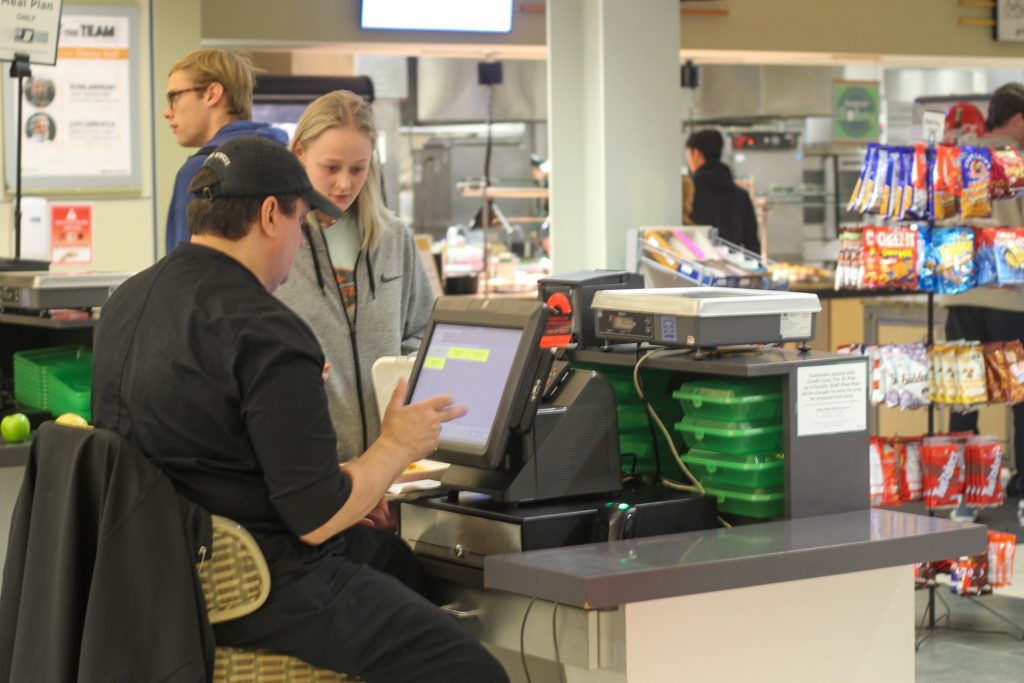
Students have been signing a petition in favor of changing Binghamton University’s meal plan system.
A group of nine students have started a petition to change BU Dining Services’ (BUDS) current meal plan system from a pay-per-item system to a “meal swipes” system. The petition, posted to Change.org three weeks ago, has accumulated 466 signatures as of Nov. 16, and aims to address theft in dining halls and the affordability of food items. Multiple other schools that use Sodexo as their dining provider have meal swipes systems in place, including the University at Albany and Stony Brook University.
The group of students behind this petition include three freshmen — Amelia Kongevold and Natalia Pecheny, both majoring in psychology, and Luna Azcurrain, an undeclared freshman — as well as four sophomores — Angelica Rao and Rebecca Kaufman, both majoring in psychology, Ava Kiner, a double-major in psychology and women, gender and sexuality studies and Azaria Walker, who is majoring in philosophy, politics and law. Two seniors also are also behind the petition — including Sophia Richardson, a double-major in biology and women, gender and sexuality studies and Kaylei Raefski, a double-major in political science and Spanish.
The students stated that their main concern with the current meal plan system is its tendency to “push students toward unhealthy eating habits.”
“Less nutritious items, like french fries and macaroni and cheese, are the only foods that would be able to sustain a budget as restrictive as [$8] a day for [three] meals a day,” the group wrote in a statement. “Many living on campus rely solely on dining hall services, and it is a simple fact that it is impossible to maintain a well-rounded diet, with enough nutrients and calories, with the current system in place. The price for the average meal plan (Option C) is $2,950, with only $950 available to students after ‘membership fees.’”
All students living on-campus, with the exception of those in the Susquehanna Community and Hillside Community, are required to purchase meal plans, according to the BUDS Meal Plan Options web page. The web page describes BU’s pay-per-item meal plan system as being accommodating of students’ “unique eating habits”, where there are “no lost meals and no limits on how often or when you can dine.”
BU’s Student Culinary Council (SCC), a group of students who advocate for student-dining interests on and off campus, wrote that they plan to bring the petition and its concerns to the University administration.
“Students turning to unhealthy options or eating fewer meals in order to stay within their meal plan is obviously something that no one wants to see and an issue that needs to promptly be addressed,” the SCC wrote in an email. “The goal of SCC is to be the link between the student body and the dining hall administration in order to enable open and honest conversations about food on campus. We have been able to form a close relationship with the administration through our bi-weekly meetings which are open to all students, and I can say with confidence that they care about the well-being of the students here at BU.”
The group of petitioners, who had reached out to the SCC for support on their project, said they were told their idea may be outside the purview of the SCC’s powers, and that the project may take more time than the group has.
Matthew Keczmer, a sophomore majoring in mechanical engineering, is one of the 466 students who have signed the petition. While Keczmer is not certain a meal swipes system is the solution, he expressed hope that University administration will address the petition’s grievances.
“With constantly rising food costs, it’s no longer possible for students to properly feed themselves and stay on a budget,” Keczmer wrote. “It also makes no sense to me that most students pay upwards of $3K on meal plans while only a third of that amount is available to spend. Where is the rest going?”
The group of students behind the petition also believe a meal swipe system could increase students’ food choices and decrease the amount of theft in dining halls, according to their statement. They attributed theft in the dining halls to the high cost of items and students being unable to afford three meals every day, and provided a graph illustrating dining hall meal items — such as fruit or salad bar-items — as being four to five dollars more expensive than the average breakfast, lunch or dinner.
Alexandrea Goyette, a junior majoring in environmental science, has not signed the petition but agreed its aim is “a good idea,” citing past incidents of her friends skipping meals in order to budget their meal plan.
“I feel like this way kids wouldn’t be trying to starve themselves just to budget correctly, especially with how expensive the dining hall food has gotten,” Goyette said. “I visited [BU] right before [COVID-19] hit when I was a junior in high school — that was like 2018, it might have been the spring of 2019. I remember when they were talking on tour, they were boasting how you could pay a set amount of money, which was more expensive, but then you got unlimited meal swipes, if that was something you wanted as an option. So they at least had it as an option. And I think [COVID-19] changed a lot of things.”
BUDS did not respond to request for comment.


